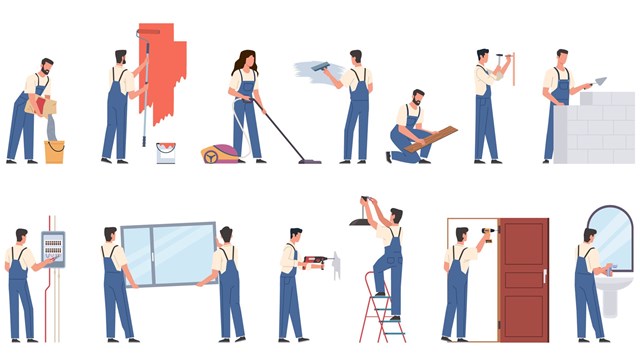Running a community association can be – and often is – stressful enough without the added issue of people in a position of power in the community using that position for personal gain in the form of kickbacks. Whether the offender is a superintendent, manager or board member, skirting the rules around bidding out projects, hiring vendors and service providers, or purchasing supplies in order to receive money or favors is rarely, if ever, worth the risk for the perpetrator. In the end, it can cause serious harm to a community and those who live there. Understanding what kickbacks are and knowing what to look for can help ethical board members and managers recognize and prevent them from infecting their building or HOA.
Plotting and Scheming
In order to snuff out a kickback racket, it’s important to know how it develops in the first place, and why.
“Kickback or bribery schemes often arise when a contractor or other service provider wants to gain access to or maintain a relationship with a building or community association,” says attorney Michael T. Reilly of Norris McLaughlin P.A., in New York City. “Board members and/or managing agents are likely approached and asked for their ‘support’ when it comes time to vote for the selection of a vendor at a board meeting. The illegal scheme may start with the vendor asking, ‘What will it take to be awarded a contract?’ The assumption being, of course, that the board or agent will not go with the vendor with the lowest price or the best qualifications, but rather with the vendor that provides ‘extras’ – be that cash, tickets, travel, free restoration work, or another benefit in exchange for them being selected. The frequency of providing these ‘extras’ may vary depending on the size of the contract and whether or not it’s a recurring service.”
Sebastian Buttafucco, a property manager with Kaled Management, which has offices throughout New York, laments that kickbacks in the industry are both real and very serious. “I have had contractors offer me kickbacks, and have immediately turned them away and notified my colleagues so that they too can steer clear,” Buttafucco says. “To me, when it comes to receiving kickbacks, the ones you need to look out for most are the boards. The boards hold the power to approve or reject proposals or quotes, and because of this will sometimes send friends to bid on projects. I once mistakenly received a quote that was meant for a board president, and which included a promise of profit. The individual was immediately removed from the board, and no work was done with that company. But it’s a very tricky field, as there are so many different people involved in these projects and decisions.”
The penalties associated with being caught engaging in a kickback scheme can be steep. “Managers could lose their licenses, and directors or officers could be subject to litigation for doing so,” says Gregory W. McCracken, a partner at the law firm of Jacobs, Walker, Rice & Barry in Manchester, Connecticut. “Statutes covering community association managers prohibit any act or conduct that constitutes dishonest, fraudulent or improper dealings. Directors and officers must similarly act in good faith in a way they reasonably believe to be in the best interests of the association. Kickbacks would clearly run afoul of these requirements.”
Paying the Cost
The consequences of accepting a kickback or bribe are rarely as convenient as ‘the job gets done well, and somebody lines their pockets.’ The cost usually ends up being shouldered by the community’s residents, who were unaware that anything shady was ever happening.
“Kickbacks have a few issues that can lead to consequences both clear and hidden,” says Mark B. Levine, a principal with property management firm EBMG, LLC, which has offices in Long Island, Brooklyn, and Manhattan. “Because of their nature in providing money to someone other than a contractor for services rendered, the price for those services will be driven up to cover the extra expense. In addition, if you’re only willing to work with vendors who are providing kickbacks, the field is narrowed and competition is stalled, which also leads to higher pricing and a non-competitive marketplace. This can lead to an inferior company performing the service, as well as future expenses and problems down the line.”
Combat and Consequences
Fortunately, there are ways that ethical residents, board members, and managers at a residential property can work to ensure that their community remains kickback-free.
“I do my best to look for signs that something doesn’t seem right, and always use outside companies that are not associated with the board or anyone else involved with the building,” says Buttafucco. “To avoid conflicts of interest, boards are also now required to sign a form, which states that they will not receive any monies or compensation for any work done at their building.”
“To reduce the chance of influence from either a contractor or the board members and managers themselves, transparency should be sought during a bidding process for large capital projects,” adds Reilly. “Sealed submissions of bids are recommended, and having bid openings with multiple witnesses is encouraged. Similarly, vendors should not be told what number to come in at to get a job.”
When hiring contractors, a board or manager can do their due diligence by making it known that not only will they not solicit kickbacks, but they’ll be vigilant against even the perception of sketchiness.
“Decades ago when I first started working, we were on a job, and I was with Glenn Kuffel, the owner of the company at the time,” recalls Alex Kuffel, President of Pride Property Management Corp., which has offices in New York and New Jersey. “We met with a roofer who said, ‘I will do whatever it takes to get this job,’ and Glenn inquired as to what that meant, exactly. The roofer replied, ‘I’ll give you 10%.’ Now this was a while ago and I don’t advocate doing this now, but, as soon as the roofer said that, Glenn smacked that contractor straight across the face and said, ‘If you ever say anything like that again, I will put your a** in jail.’ So we never used that contractor.”
Assuming Good Faith
As stated previously, kickbacks and bribery definitely do happen. But while it’s important to not be naive about that reality, it’s also important to keep in mind that given the many thousands of co-op, condo and HOA communities across the country, fraud is a relatively rare occurrence. Because of that rarity – and the seriousness of the allegation – association members must do their due diligence before pointing fingers, lest false accusations fly.
“I often see board members accused of playing favorites or getting benefits that the rest of the community did not – but these claims are mostly baseless,” says Scott J. Sandler, Managing Partner at Sandler, Hansen & Alexander, a law firm in Middletown, Connecticut. “Society has just degraded to a point where everyone is accusing each other, pointing fingers, assuming the worst. We do live in a world where every now and again you encounter a bad actor; a manager walks away with association funds, or a board member tries to convince the board to hire his buddy – but thankfully those are the exceptions to the rule. It’s up to the community at large to remain diligent. Boards serve at the pleasure of the owners, and if those owners decide that the board is not diligently serving its community, then it’s up to those owners to remove the board members and install new ones.”
Those individuals who do get caught accepting kickbacks face jail time and forced restitution as proposed by the courts, notes Reilly. “Board members can be removed for cause, and managing agents can be fired, which may in turn ruin the reputation of their employers,” he says.
Of course, it stands to reason that those willing to break the law and engage in kickbacks or bribes may also be amenable to violating contracts or agreements. That’s a big part of why it falls to that ethical board member, manager, resident to identify and call out transgressive behavior when they see it.
“I believe that most people, presented with the opportunity for a kickback, are just going to feel weird about it,” says John Kadim, a portfolio property manager with Thayer & Associates in Cambridge, Massachusetts. “Generally, if you have that weird feeling about something, it’s likely not something that you should be doing. It’s really that simple.”
Hopefully, it shouldn’t take more than a reminder that the risk inherent in corruption outweighs the reward for someone to think twice and stay on the straight and narrow.
Mike Odenthal is a staff writer with The Cooperator.







Leave a Comment